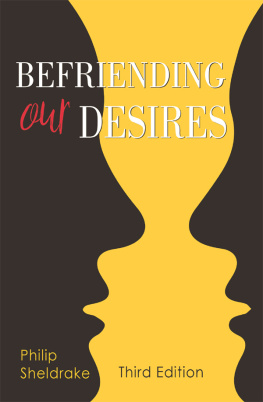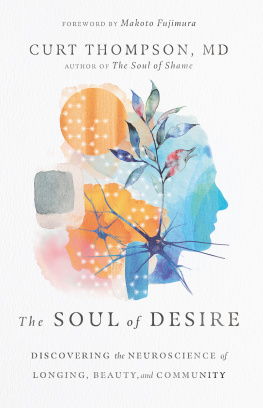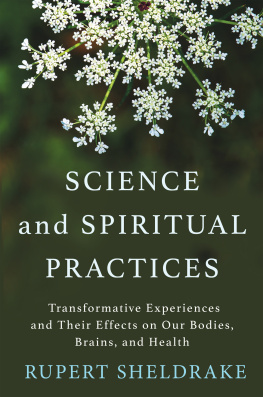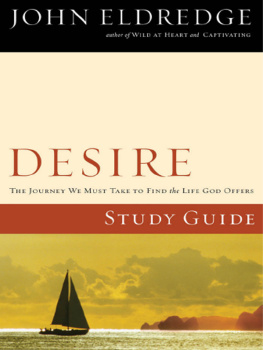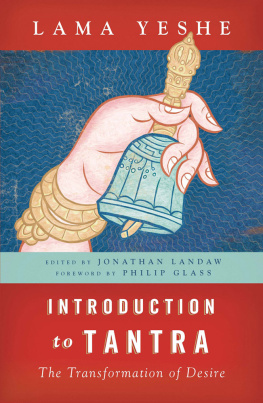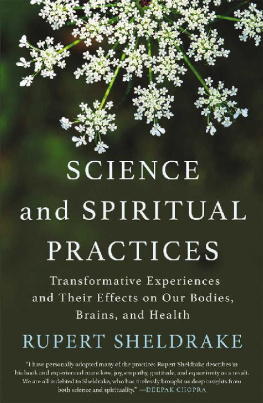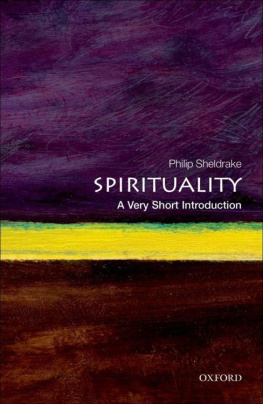Befriending Our Desires is a thoroughly learned and readable book that offers a dynamic vision of Christian spirituality. Philip Sheldrake retrieves desire as a key dimension of a fully embodied, vulnerable, and authentic spirituality. Always informed by Sheldrakes deep knowledge of the Christian tradition, the book presents carefully nuanced readings of Scriptures, mystics, poets, theologians, and theorists while remaining in touch with ordinary human struggles toward growth. Delighted to see this third edition in print!
Claire Wolfteich
Associate Professor of Practical Theology and Spirituality Studies
Co-Director, Center for Practical Theology
Boston University School of Theology
An extraordinarily beautiful and honest account of the role of desire in the spiritual life. Not a sanitized version, but a fully embodied, deeply human depiction of longing that is bound up with our humanity but also mysteriously reaches out and into something not entirely nameable or knowableas our longings so often do.
Douglas E. Christie
Department of Theological Studies
Loyola Marymount University
Befriending Our Desires is a deeply considered and artfully written celebration of the human capacity for self-transcendence. Sheldrake plumbs the mystery of human desire in all its rich variety: its spiritual dynamism, the mature cultivation and direction of its intrinsic power, its relational implications, and its ultimate goodness. A beautiful and encouraging book.
Wendy M. Wright, PhD
Professor of Theology
Creighton University
The ache of the heart is the lure of God. Few writers explicate so clearly that intricate, yet intimate, interconnection. Philip Sheldrake does. He is truly a doctor of the soul, and this book is proof. Highly recommended for anyone who is searching for a more coherent grasp of their spiritual life.
Ronald Rolheiser, OMI
Cover design by Monica Bokinskie. Image courtesy of Shutterstock.
The English translation of the Non-Biblical Reading from The Liturgy of the Hours 1973, 1974, 1975, International Commission on English in the Liturgy Corporation. All rights reserved.
Scripture texts in the work are taken from the New Jerusalem Bible.
2016 by Order of Saint Benedict, Collegeville, Minnesota. All rights reserved. No part of this book may be reproduced in any form, by print, microfilm, microfiche, mechanical recording, photocopying, translation, or by any other means, known or yet unknown, for any purpose except brief quotations in reviews, without the previous written permission of Liturgical Press, Saint Johns Abbey, PO Box 7500, Collegeville, Minnesota 56321-7500. Printed in the United States of America.
The Library of Congress has cataloged the printed edition as follows:
Library of Congress Cataloging-in-Publication Data
Names: Sheldrake, Philip.
Title: Befriending our desires / Philip Sheldrake.
Description: Third edition. | Collegeville, Minnesota : Liturgical Press, [2016] | Includes bibliographical references.
Identifiers: LCCN 2016007167 (print) | LCCN 2016008356 (ebook) | ISBN 9780814647172 (pbk.) | ISBN 9780814647424 (ebook)
Subjects: LCSH: Spirituality. | Desire.
Classification: LCC BV4501 .S4367 2016 (print) | LCC BV4501 (ebook) | DDC 248.4dc23
LC record available at http://lccn.loc.gov/2016007167
For Susie
Contents
Preface to the Third Edition
I am very pleased that Liturgical Press is publishing this revised third edition of Befriending Our Desires. In particular, I am grateful to Hans Christoffersen for suggesting the project and for his helpful advice about new material.
The original book appeared in 1994 and the second edition in 2001. Apart from a range of editorial changes and stylistic improvements throughout the book, the third edition has a completely new, substantially longer, introduction. This includes helpful material on the teachings of the Buddha as well as references to the theme of desire in the striking poetry of George Herbert, the seventeenth-century English poet and priest. In chapter 5, Desire and Choosing, I have also added some new material on the Christian tradition of discernment and of choosing well.
My intention continues to be to offer helpful insights that place desire at the very heart of our spiritual journey. As I suggested in my preface to the second edition, for many people the word desire is essentially associated with sexuality. It is certainly true that sexuality and spirituality are intimately connected, despite negative attitudes to sexual questions by religious people in the past as well as the contemporary commercialisation of sex. However, as the book tries to underline, a spirituality of desire is much broader than sexuality. Only by attending thoughtfully to our many wants, longings, and passions can we gradually discern our truest desires. In doing so, we encounter the depths of our existence and are able to engage with the God who dwells within us and whose own longing enlivens our own.
The original book owed a great deal to various courses I taught at the Summer Institute of the University of Notre Dame as well as to classes with Anglican ordinands at Westcott House, Cambridge. Since then the book has provoked conversations and exchanges with a range of people. It also led to invitations to speak and to conduct workshops in the United Kingdom, Ireland, the United States, and Norway (sometimes with my partner Susie) in the areas of spirituality and sexuality or of discernment and choice. These experiences have helped me to develop my thinking further and therefore to improve the book.
The Scripture quotations I cite are taken from the New Jerusalem Bible and a list of other works quoted in the book appears at the end.
I wish to thank Westcott House in the Cambridge Theological Federation, where I am a senior research fellow, and Oblate School of Theology, San Antonio, Texas, where I am director of the Institute for the Study of Contemporary Spirituality. Both places offer congenial contexts in which to think and write.
Finally, I am very grateful to my partner Susie for her imaginative cover design and I dedicate this book to her with much love.
Philip Sheldrake
Westcott House, Cambridge
Oblate School of Theology, San Antonio, Texas
2016
Introduction
The heart has its reasons, which reason does not know.
Blaise Pascal
D esire lies at the heart of what it is to be human. There is an energy within all of us that haunts us and can either lead us to set out on a quest for something more or can frustrate us by making us nostalgic for what we do not have. This is true of all of us. But we all know of some people who plunge into the events of life and into relationships with unusual passion. Their energy can be attractive, and yet at the same time, it is unnerving. There is a feeling of restlessness about such people. They seem to suffer from an insatiable desire for more of lifea hunger and thirst that is never satisfied. Such strong desires can get dangerously out of control. The American novelist Anne Lamott, in her bestseller Traveling Mercies, movingly and powerfully describes her own struggles with such passionate desire. For years her deep sense of dissatisfaction with herself and with life and a persistent restlessness drove her into a succession of relationships and to the abuse of alcohol and drugs. Somewhere deep down, however, a journey of faith was also in progress. In the end, in an unsentimental and reluctant way, Anne came not only to believe in God but also to discover in her faith a means of focussing her passionate desire into a committed love for the processes and people of everyday life.

